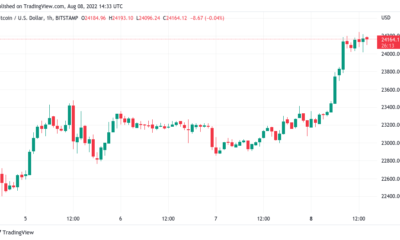Technology & Innovation
supply chain | MIT Technology Review

For companies producing just about any physical product, the many “black swan” events (catastrophic incidents that are nearly impossible to predict) of the last four years illustrate the importance of supply chain resilience—businesses’ ability to anticipate, respond, and bounce back. Yet many organizations still don’t have robust measures in place for future setbacks.
In a poll of 250 business leaders conducted by MIT technology Review Insights in partnership with Infosys Cobalt, just 12% say their supply chains are in a “fully modern, integrated” state. Almost half of respondents’ firms (47%) regularly experience some supply chain disruptions—nearly one in five (19%) say they feel “constant pressure,” and 28% experience
“occasional disruptions.” A mere 6% say disruptions aren’t an issue. But there’s hope on the horizon. In 2024, rapidly advancing technologies are making transparent, collaborative, and data-driven supply chains more realistic.
“Emerging technologies can play a vital role in creating more sustainable and circular supply chains,” says Dinesh Rao, executive vice president and co-head of delivery at digital services and consulting company Infosys. “Recent strides in artificial intelligence and machine learning, blockchain, and other systems will help build the ability to deliver future-ready, resilient supply chains.”
This content was produced by Insights, the custom content arm of MIT technology Review. It was not written by MIT technology Review’s editorial staff.
Technology & Innovation
The Download: AI drugs, and how AI is improving soccer tactics

This is today’s edition of The Download, our weekday newsletter that provides a daily dose of what’s going on in the world of technology.
A wave of drugs dreamed up by AI is on its way
Alex Zhavoronkov has been messing around with artificial intelligence for more than a decade. In 2016, the programmer and physicist was using AI to rank people by looks and sort through pictures of cats.
Now he says his company, Insilico Medicine, has created the first “true AI drug” that’s advanced to a test of whether it can cure a fatal lung condition in humans.
Popular forms of AI can draw pictures and answer questions. But there’s a growing effort to get AI to dream up cures for awful diseases, too. The problem they are solving, however, is an old one. Read the full story.
—Antonio Regalado
Google DeepMind’s new AI assistant helps elite soccer coaches get even better
The news: Soccer teams are always looking to get an edge over their rivals. They might want to add a new AI assistant developed by Google DeepMind to their arsenal. It can suggest tactics for soccer set-pieces that are even better than those created by professional club coaches.
How it works: The system, called TacticAI, works by analyzing a dataset of 7,176 corner kicks taken by players for Liverpool FC, one of the biggest soccer clubs in the world. It uses predictive and generative AI models to analyze each scenario and produce recommendations and predictive outcomes. Read the full story.
—Rhiannon Williams
Chinese platforms are cracking down on influencers selling AI lessons
Over the last year, a few Chinese influencers have made millions of dollars peddling short video lessons on AI, profiting off people’s fears about the as-yet-unclear impact of the new technology on their livelihoods.
But the platforms they thrived on have started to turn against them. Just a few weeks ago, WeChat and Douyin began suspending, removing, or restricting their accounts. While influencers on these platforms have been turning people’s anxiety into traffic and profits for a long time, the latest actions show how Chinese social platforms are trying to contain the damage before it goes too far. Read the full story.
—Zeyi Yang
This story is from China Report, our weekly newsletter giving you the inside track on all things happening in China. Sign up to receive it in your inbox every Tuesday.
The must-reads
I’ve combed the internet to find you today’s most fun/important/scary/fascinating stories about technology.
1 DeepMind co-founder Mustafa Suleyman is joining Microsoft
He’ll head up the company’s consumer arm, developing AI-infused products. (Bloomberg $)
+ Suleyman will leave his startup, Inflection AI, along with a load of its staff. (technology/mustafa-suleyman-google-gemini.html”>NYT $)
+ Inflection’s investors won’t be left out of pocket, though. (The Information $)
+ Check out our interview with Suleyman about why he thinks generative AI is just a phase. (MIT technology Review)
2 China is sending a satellite to the dark side of the moon
It’ll play a crucial role in the country’s bid to leapfrog the US in moon exploration. (technology/space/china-launches-satellite-queqiao-2-upcoming-lunar-missions-2024-03-20/”>Reuters)
+ Some scientists aren’t sure if exploring Mars is a wise investment. (Undark Magazine)
3 Anonymous career site Glassdoor exposed its users’ real names
Which, unsurprisingly, has upset users who posted honest reviews of their former workplaces. (Ars Technica)
4 The concrete industry has a major carbon problem
Now, emission-capturing formulas could make a difference. (Wired $)
+ The climate solution beneath your feet. (MIT technology Review)
5 Artists who use AI are more productive
But, crucially, they’re less original. (New Scientist $)
+ This artist is dominating AI-generated art. And he’s not happy about it. (MIT technology Review)
6 Saudi Arabia is poised to become an AI superpower
To the tune of a $40 billion sinking fund. (NYT $)
+ We’re just five years away from artificial general intelligence, according to Nvidia CEO Jensen Huang, at least. (TechCrunch)
+ Google DeepMind wants to define what counts as artificial general intelligence. (MIT technology Review)
7 Brace yourself—dynamic pricing is coming
Emboldened by Uber’s surge pricing model, other businesses want in. (Vox)
8 Indonesia’s ebike shops are dicing with danger
They’re creating souped-up batteries that prioritize power over safety. (Rest of World)
+ Three things to love about batteries. (MIT technology Review)
9 Did you just poke me on Facebook?
The social network has quietly restored one of its weirdest features. (Insider $)
10 This unknown Swedish composer has racked up more Spotify plays than ABBA
Johan Röhr is the mastermind behind more than 650 different artists on the platform. (The Guardian)
Quote of the day
“It feels very self-centered. Everyone is like, ‘I’ve got somewhere to be, out of my way.’”
—Tamara Siemering, an actor who recently moved to Los Angeles, explains her shock at the city’s driving culture as it tries to embrace autonomous cars, the New York Times reports.
The big story
Inside the enigmatic minds of animals
October 2022
More than ever, we feel a duty and desire to extend empathy to our nonhuman neighbors. In the last three years, more than 30 countries have formally recognized other animals—including gorillas, lobsters, crows, and octopuses—as sentient beings.
A trio of books from Ed Yong, Jackie Higgins, and Philip Ball detail creatures’ rich inner worlds and capture what has led to these developments: a booming field of experimental research challenging the long-standing view that animals are neither conscious nor cognitively complex. Read the full story.
—Matthew Ponsford
We can still have nice things
A place for comfort, fun and distraction to brighten up your day. (Got any ideas? Drop me a line or tweet ’em at me.)
+ One for fans of The Strokes: a thread of cool references throughout their artwork.
+ A Japanese pig cafe sounds like a pretty relaxing place to hang out. 
+ If Dolly Parton was Welsh, this is what Jolene would sound like.
+ A happy belated Nowruz to all those who celebrate!
Technology & Innovation
The Download: New AI regulations, and a running robot

The big story
One city’s fight to solve its sewage problem with sensors
April 2021
In the city of South Bend, Indiana, wastewater from people’s kitchens, sinks, washing machines, and toilets flows through 35 neighborhood sewer lines. On good days, just before each line ends, a vertical throttle pipe diverts the sewage into an interceptor tube, which carries it to a treatment plant where solid pollutants and bacteria are filtered out.
As in many American cities, those pipes are combined with storm drains, which can fill rivers and lakes with toxic sludge when heavy rains or melted snow overwhelms them, endangering wildlife and drinking water supplies. But city officials have a plan to make its aging sewers significantly smarter. Read the full story.
—Andrew Zaleski
We can still have nice things
A place for comfort, fun and distraction to brighten up your day. (Got any ideas? Drop me a line or tweet ’em at me.)
+ These kind wildlife workers in Virginia really went above and beyond to look after an orphaned fox kit.
+ This version of Smells Like Teen Spirit is banging.
+ Techno, techno, techno! Why Berlin’s clubbing culture has been placed under Unesco protection.
+ Enjoy a bit of John Denver this morning, for no reason other than it’s a wonderful song.
Technology & Innovation
Harvard has halted its long-planned atmospheric geoengineering experiment

But the project switched locations several times. Most recently, the team hoped to launch a balloon to test out the aircraft’s hardware from the Esrange Space Center in Kiruna, Sweden in the summer of 2021. But those plans were canceled on the recommendation of the project’s advisory committee, which determined the researchers should hold discussions with the public ahead of any flights. The effort was also heavily criticized by the Saami Council, which represents the indigenous Saami peoples’ groups in Sweden and neighboring regions, as well as environmental groups and other organizations, who argued it’s too dangerous a tool to use.
ELIZA GRINNELL, HARVARD SCHOOL OF ENGINEERING AND APPLIED SCIENCE
Solar geoengineering “is a technology that entails risks of catastrophic consequences, including the impact of uncontrolled termination, and irreversible sociopolitical effects that could compromise the world’s necessary efforts to achieve zero-carbon societies,” the group wrote in a letter to the advisory committee. “There are therefore no acceptable reasons for allowing the SCoPEx project to be conducted either in Sweden or elsewhere.”
When asked why he decided to stop work on the experiment, and if it had anything to do with the public pushback or delays, Keutsch replied via email that he “learned important lessons about governance and engagement throughout the course of this project.”
“The field of [solar radiation management] has undergone a significant transformation in the last few years, expanding the community and opening new doors for research and collaboration,” he added. “I felt that it was time to focus on other innovative research avenues in the incredibly important field of SRM that promise impactful results.”
Amid the delays to the Harvard project, other groups have forged ahead with their own geoengineering-related efforts. The controversial venture-backed startup, Make Sunsets, has repeatedly launched weather balloons filled with a few grams of sulfur dioxide that it claims likely burst in the stratosphere. Meanwhile, an independent researcher in the UK, Andrew Lockley, says he carried out several balloon launches, including a September 2022 flight that burst about 15 miles above the Earth and could have released around 400 grams of sulfur dioxide.
Despite the public controversy, the SCoPEx researchers earned high marks among some in the field for striving to carry out the field effort in a small-scale, controlled, transparent way, setting down clear research objectives and creating an independent advisory committee to review the proposals.
Gernot Wagner, a climate economist at Columbia Business School and the former executive director of Harvard’s Solar Geoengineering Research Program, said in an email that the cancellation of the project was “unfortunate,” as it had taken on larger significance in the field.
He stressed that the effort “widened the operating space for other, younger researchers to look into this important topic.” In addition, by publishing the plans in a peer-reviewed journal and operating transparently, the group “set a standard of sorts for responsible research in this area,” he added.
-

 Technology & Innovation2 years ago
Technology & Innovation2 years agoHow to get people to help you
-

 Technology & Innovation2 years ago
Technology & Innovation2 years agoWhy are scams getting worse?
-

 Sales & Marketing2 years ago
Sales & Marketing2 years agoVodafone invites Snapchatters to connect with Emma Raducanu virtually
-

 Cryptocurrency2 years ago
Cryptocurrency2 years agoBitcoin price targets 8-week highs as Ethereum reaches $1.8K
-

 Cryptocurrency1 year ago
Cryptocurrency1 year agoAre there too many cryptocurrencies?
-

 Technology & Innovation2 years ago
Technology & Innovation2 years agoHow Log4Shell threatens the Internet
-

 Business & Finance2 years ago
Business & Finance2 years agoHere’s How Apple CEO Earned 500% More In 2021
-

 Business & Finance2 years ago
Business & Finance2 years agoUN Announces Talks To Help Resolve Sudan’s Political Crisis













